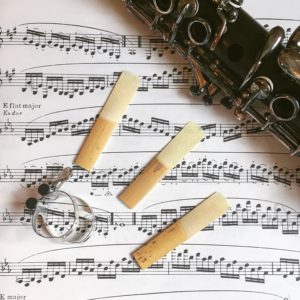The great singers (and how singing can help your clarinet playing)
This blog post originally appeared as a digital clarinet studio lecture for the Iowa State University clarinetists.
Singing is one of the most natural forms of music-making (and also one of the oldest). When you sing, you have no instrument, reeds, mouthpieces, ligatures, or any unnecessary equipment to bog you down. Granted, it takes a well-trained set of lungs and other specific vocal skills which can take many years to perfect, so singing is not quite as easy as many people seem to believe.
I believe that listening to great singers and incorporating singing into your personal practice is an important part of any instrumental pedagogy. Singing can help you identify more natural phrasing ideas, find better breathing spots, and provide an extra-instrumental dimension to your training and musical preparation.
Additionally, singers must embody their characters in a way many instrumentalists fail to achieve. This provides a visual dimension as well as the musical / auditory elements. Next time you perform a piece (even if it’s just a simple etude), try to embrace your inner actor and see if this helps your interpretation and allows you to tell a musical story.
Here are a few of my favorite singers and performances to get you inspired to “sing” through your clarinet.
There are too many incredible artists to list here, so this is just an introduction to the wonderful wide world of signers out there waiting for you to discover!
(Note: Please give these artists the proper attention they deserve. As you listen to these recordings, please do not multitask or play these as background music while you complete another task. Sit back and enjoy the absolute artistry these musicians share with the world.)
- Fritz Wunderlich sings Robert Schumann’s Dichterliebe
- Diana Damrau sings “Queen of the Night” aria from Mozart’s The Magic Flute
- Sumi Jo sings Giulio Caccini’s Ave Maria
- Maria Callas sings “Habanera” from Bizet’s Carmen
- Dietrich Fischer-Dieskau sings Franz Schubert’s “Der Erlkönig”
Keep in mind that great singers do not have to just sing classical music! Here are some of my favorite non-classical artists:
- Edith Piaf sings “Non, je ne regrette rien”
- Jacques Brel sings “Ne me quitte pas”
- Nat King Cole sings “Stardust”
- Ella Fitzgerald sings Gershwin’s “Summertime” from Porgy and Bess
- Frank Sinatra sings “My Way”
- Lady Gaga sings “You and I”
- Sarah Brightman sings “Music of the Night” from Phantom of the Opera
We are #blessed with an abundance of wonderful singers past, present, and future, and I would love to hear your favorites in the comments!

2 Comments
Robert Monie
All the suggested singers are great. On the classical side I would add Ann Moffo. Listen to her sing the wordless Rachmaninoff Vocalise. In the jazz category, Anita O’Day is memorable. Hear her sing Bewitched, Bothered, and Bewildered. Vocal expressiveness has nothing to do with the size or richness of a voice. Astrud Gilberto was the perfect Boss Nova singer, and her voice is small and unoperatic, but how delicate and sensitive to the nuances of the Brazilian musical line and rhythm. When Carly Simon does nostalgia pieces from the swing era, like Moonlight Serenade or All the Things You Are, she add pathos and a hint of tragedy. Louis Armstrong had almost no voice at all, but what music he made with it!
Then there are instrumentalists who simply sing through their instruments. Miles Davis on “My Ship Has Sailed” on the Miles Ahead album or John Coltrane playing ballads. Among clarinetists, Andre Moisan is very vocal. I’m listening to him play Kovacs After You Mr. Gershwin, and Paquito’s Cape Cod Files, and his approach is vocal throughout. No wonder in an interview that he said if he hadn’t become a musician he would have been an actor. Singing well has more to do with capturing roles in music than it does with having a naturally booming or big voice. That gets boring fast. Acting the music doesn’t.
Richard Hunter
Andread Bocelli, Nessun dorma